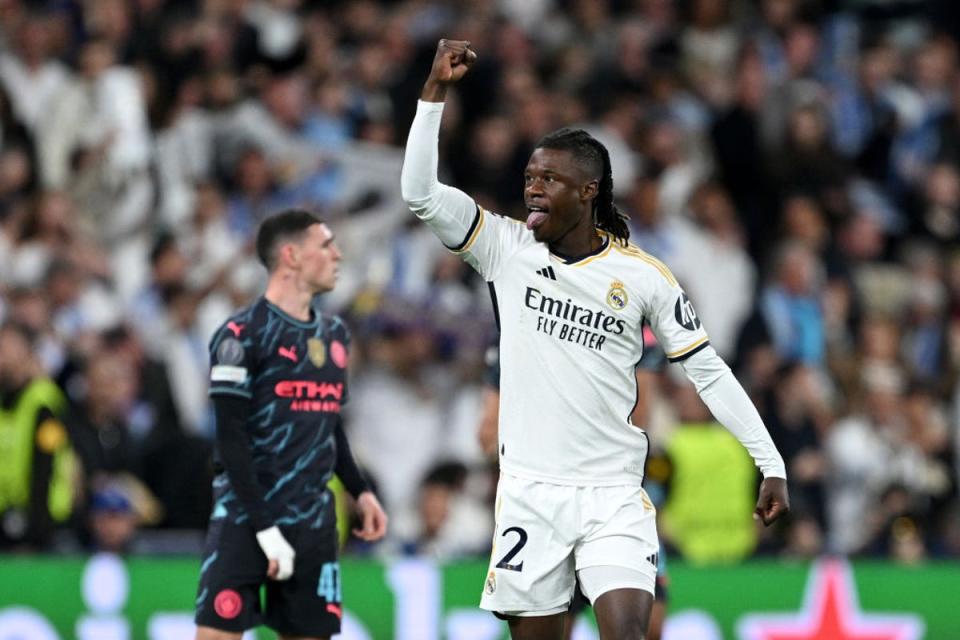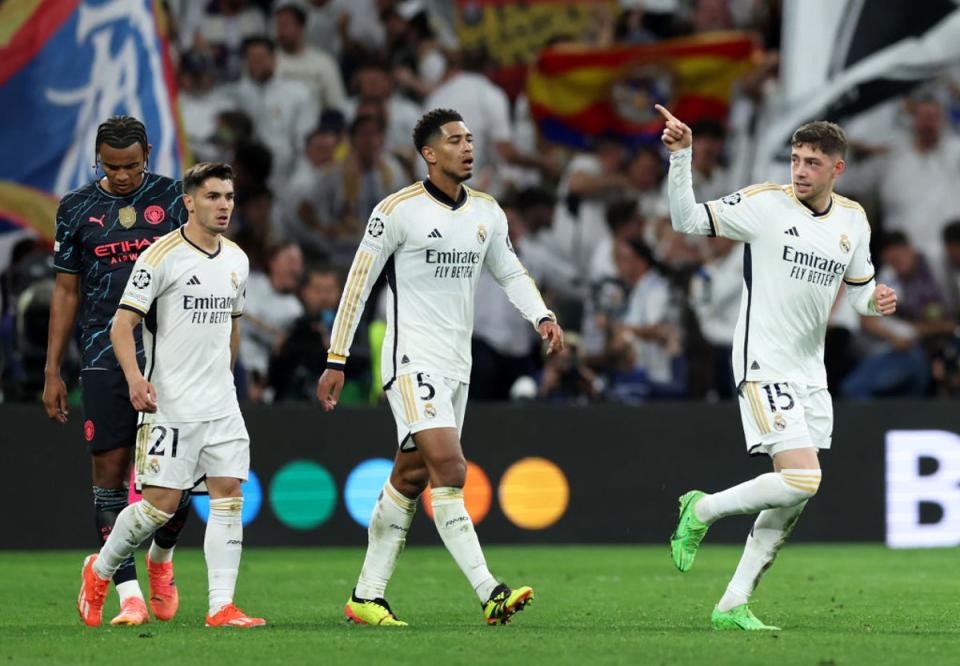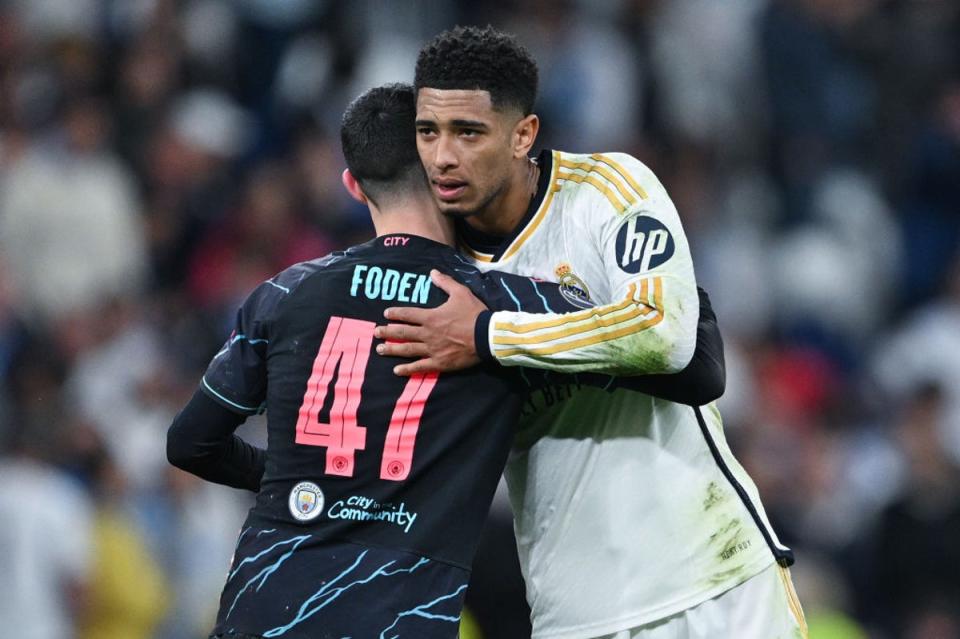Amid the goals and the excitement, Real Madrid may have just shown Man City’s downfall
There was an air of defiance in a corner at the top of one of the Bernabeu’s steepling stands as a chorus rang out. “City, the best team in the world,” came a chant that felt based more on the recent past than the evidence in front of their eyes. It came as Manchester City’s annual trip to the Bernabeu was shaping up as a chastening affair, a day when they appeared to be outrun and out-thought as well as outscored.
Some 90 minutes later, the same song rang out. The audience was different, consisting of a few City substitutes in an otherwise deserted ground, but so was the tone. If there was more belief, there was a reason for it.
Scoring three goals away from home against the team many would deem the second finest on the planet strengthened their case; eliminate Real Madrid next week and it will feel stronger again. And if there was an illogical element to the beauty of the City goals – Pep Guardiola’s style of play is marked more by short passing than long-range shooting – a hat-trick of magnificent strikes at the Bernabeu is more than most sides muster in a decade, let alone a night.
Real and City is one of Europe’s more recent rivalries: Bernardo Silva had already etched his name into its folklore but now he has a further entry, and is accompanied by Phil Foden and Josko Gvardiol.
And yet a match where the lead changed hands with both suddenness and regularity lent itself to different conclusions. Perhaps it was the sort of game where City proved their greatness, where they overcame every obstacle, from the late withdrawal of Kevin de Bruyne to Real’s electric first half, with the aid of Guardiola’s tactical brilliance.
Or maybe it was the kind of game to offer a preview of how empires fall. Real highlighted some of the shortcomings in this City side; if Guardiola’s team do not dominate Europe for years, as some predicted in the wake of their treble last year, it will probably be possible to look back on a six-goal thriller at the Bernabeu and see signs of where it was starting to go wrong. Scoring three wonder goals, hugely entertaining as it was, is not a failsafe formula; City could easily have been 3-1 down before Foden delivered the second of them.
City have rarely looked as fallible, as open, as they were before the break but they have not been watertight at the back this season. Their recent record stands at two clean sheets in nine games; go back further and it is 10 in 31. City conceded three goals in the Champions League’s knockout stages last season. They conceded three in one night in Madrid.


If balance has been elusive since Ilkay Gundogan left, control has been more fragile. “It is impossible to control all the time against Real Madrid,” Guardiola said. The issue, though, was how frail City looked when they lost control. It was, Guardiola felt, the kind of night where they would have been eliminated in previous years. “This result or this game in the first three seasons together, we’d have lost 4-1 or 5-1,” he said. “We were not stable emotionally.”
If an improved mentality brought salvation, so did managerial intervention and individual inspiration. The sense Guardiola is working with lesser tools was underlined by the midfields: the defining department of most of his teams but, were Mateo Kovacic still at Real, he would rank behind Jude Bellingham, Toni Kroos, Luka Modric, Eduardo Camavinga, Fede Valverde and Aurelien Tchouameni in the lengthy queue for places. Increasingly averse to using substitutes, Guardiola made no changes until the 87th minute, but his options were reduced.
De Bruyne was slated to start until he arrived at the ground and began vomiting. City were without their captain, vice-captain, most consistent defender and goalkeeper. “Kyle [Walker] is not here. Nathan [Ake] is not here. Kevin cannot play,” listed Guardiola, without even getting on to Ederson. “We play with 11. I would prefer them to be here.”
In the circumstances, the draw became a better result. “One of the secrets in the high level is to adapt quickly to chaos,” rationalised Guardiola. “There is no time to complain.” Nor did he. Minus four key players, there was a resourcefulness to the way he reorganised, getting John Stones and Silva into the centre of the pitch. In a way, a comeback was the triumph of a system, of a philosophy.

But City have been more reliant on individuals this season.
Two of their big players were ineffective: Erling Haaland, as he has been in too many major matches, and Rodri, uncharacteristically. Individuals provided salvation, with moments of magic. Spectacular, yes; Sustainable? The statistics suggest so, but the manner of it may indicate otherwise.
City left the Bernabeu unbeaten in Champions League for 22 games and almost two years, unbeaten in all competitions for 25 games. It is the record of the best, and a night that both indicated that they could remain so or that they might be toppled from their perch.

 Yahoo Sport
Yahoo Sport 



































































